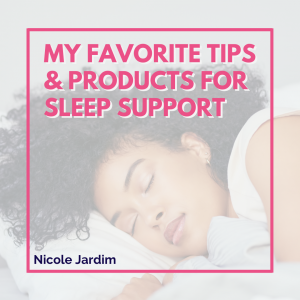Sleep is absolutely essential when it comes to menstrual health and your overall health. Honestly girl, if you’re not sleeping well everything else you’re doing to support your health won’t be as effective (or effective at all!).
Sleep is #1 and that’s why I want to share some helpful tips and some of my favorite products to get you dreaming.
The process of sleep
The body manages sleep through the circadian rhythm, a biological rhythm that has distinct times for wakefulness and sleep. There are a group of cells in the hypothalamus called the Master Clock. These cells regulate sleep, hunger, growth, hormone release, and body temperature. When it’s functioning properly, the stage is set for a restful night’s sleep.
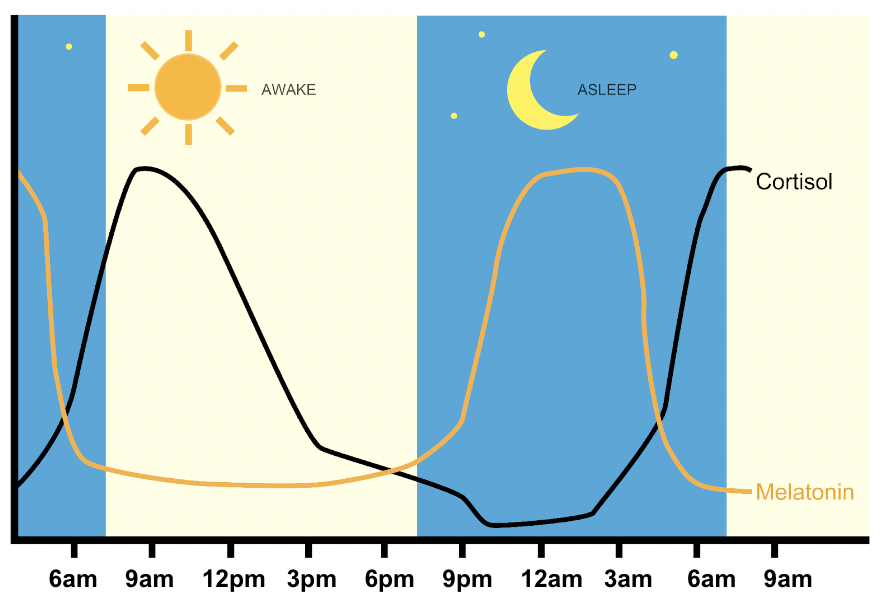
Light is what provides the main cue for these cells to function properly. When light decreases, as it’s meant to at the end of the day, melatonin is released from the pineal gland. This causes a slow transition from wakefulness to sleepiness. When light increases again, as it does in the morning, melatonin decreases, and the body shifts from sleep to wakefulness. Such a simple process, right?
Unfortunately, our modern world has complicated this for us.
What causes poor sleep?
High cortisol, especially at night, can make sleep difficult. Both falling asleep and staying asleep can be a challenge. Cortisol actually decreases melatonin in order to maintain a vigilant system, watching for threats.
Poor sleep doesn’t just affect the adrenals, though. It can also drive up appetite, increase blood pressure and blood sugar, weaken the immune system, and worsen depression.
Here’s an interesting fact – just one night of poor sleep can decrease insulin sensitivity by 33% in otherwise healthy people. This is why people tend to make poor food decisions when they’re tired and why poor sleep is associated with weight gain. If you’ve ever found it harder to resist the donuts at a morning meeting after a poor night’s sleep, then you know what I’m talking about! Ultimately, sleep is critical to maintaining not only insulin, but all the other hormones that are affected by insulin.
HPA Axis and Sleep
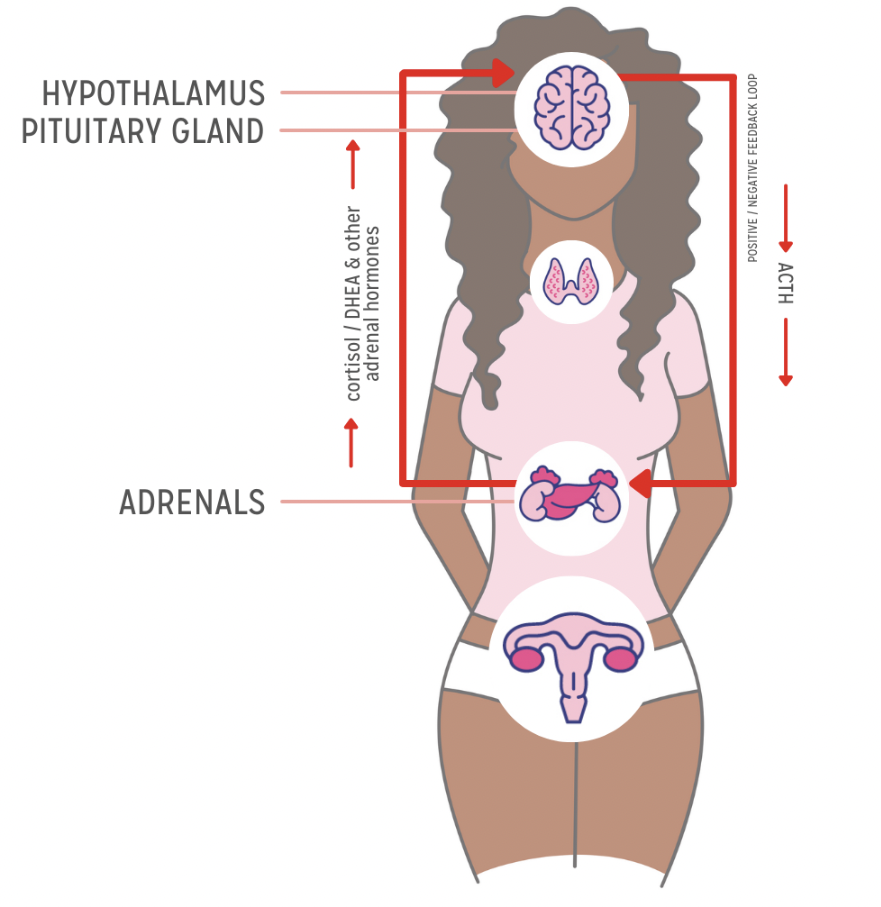
A normal HPA axis elevates cortisol levels in the morning to give you a boost and decreases them in the evenings when it’s time for rest. When this system becomes dysfunctional our circadian rhythm gets out of sync.
When cortisol remains elevated into the evening hours, this can leave you feeling “tired but wired” at night when you should be winding down. If this is you, you may experience trouble getting to sleep or, once you do fall asleep, finding it impossible to sleep through the night, waking up several times before morning.
In addition to the impact that stress has on the HPA axis, when it comes to sleep, exposure to technology in the form of TV’s and computer screens, is also having a negative effect on our cortisol regulation.
These screens emit high levels of what’s referred to as blue light. This light affects the production of that key sleep hormone, melatonin, which is secreted by the pineal gland when light levels drop in the evening.
When we’re staring at an iPad in bed, the blue light from the screen tricks our pineal gland into thinking it’s still day time and blocks the release of melatonin. This decrease in melatonin has a disruptive effect on the HPA axis which causes an increase in cortisol at the wrong times of day.
This same effect is seen in people who work night-shifts where they are forced to sleep during the day as well as people who live in places closer to the poles, where daylight hours fluctuate extremely during different seasons.
Light exposure is an important part of sleep regulation and HPA axis function so it’s critical to make sure you’re creating a sleep cycle that mimics the body’s natural internal clock, even if this means having to close the blinds and trick your body into believing it’s dark outside when it’s not.
Tips to get your sleep on track
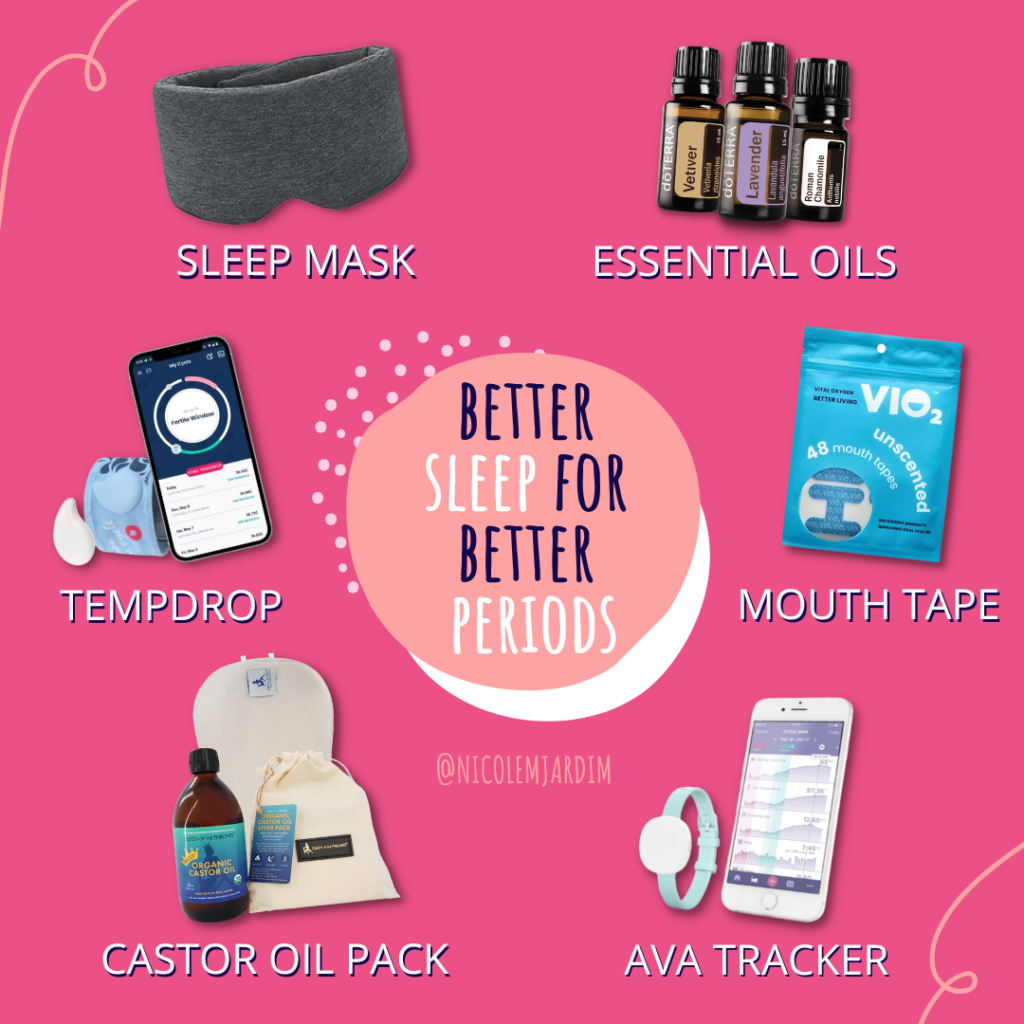
1. Establish a regular bedtime
Having a regular bedtime helps to establish a healthy sleep pattern. Think about it, if your bedtime is different every night – that’s not much of a pattern!
The body is a well-oiled machine that orchestrates so many functions, based on rhythms and signals. As such, the body likes routine. It prefers to eat, sleep, and be active on a schedule. When the schedule gets disrupted, it interferes with the normal cycle of wakefulness and sleep.
Establishing a regular bedtime and sticking to it allows the body to plan its sleep cycle. Even if you have trouble falling asleep early and lay in bed awake for a long time, getting into that restful space early on helps to wind the body down and set the stage for sleep.
For you night owls: maybe set a reminder on your phone for when to start winding down for the night.
2. Decrease usage of electronic devices before bed
Limiting exposure to electronics before bedtime helps to improve sleep. Before electric lighting, most people went to bed when it got dark and got up when the sun came up. This is how the body was designed to work. The lighting that they did have – gas or candlelight – was much more gentle on the eyes than today’s lighting. Now, we have artificial lighting, which by itself can disrupt sleep.
The light from computer screens, televisions, smart phones, and tablets is heavy on the blue light spectrum, which is particularly stimulating to the brain. Even one evening of blue light exposure can result in having less energy and a slower metabolism the next day.
To limit blue light exposure in the evenings, try putting away your electronics two hours before bed.
If you just can’t do it, perhaps due to work requirements, most electronics have a setting that allows the blue light to be reduced. On some devices, this can even be set on a schedule to gradually reduce the blue light output over time, up to an established bedtime.
You can also use blue light-shielding glasses, known as “blue blockers” which block the blue light but let the rest in. These have been shown to be effective in improving sleep quality and length.
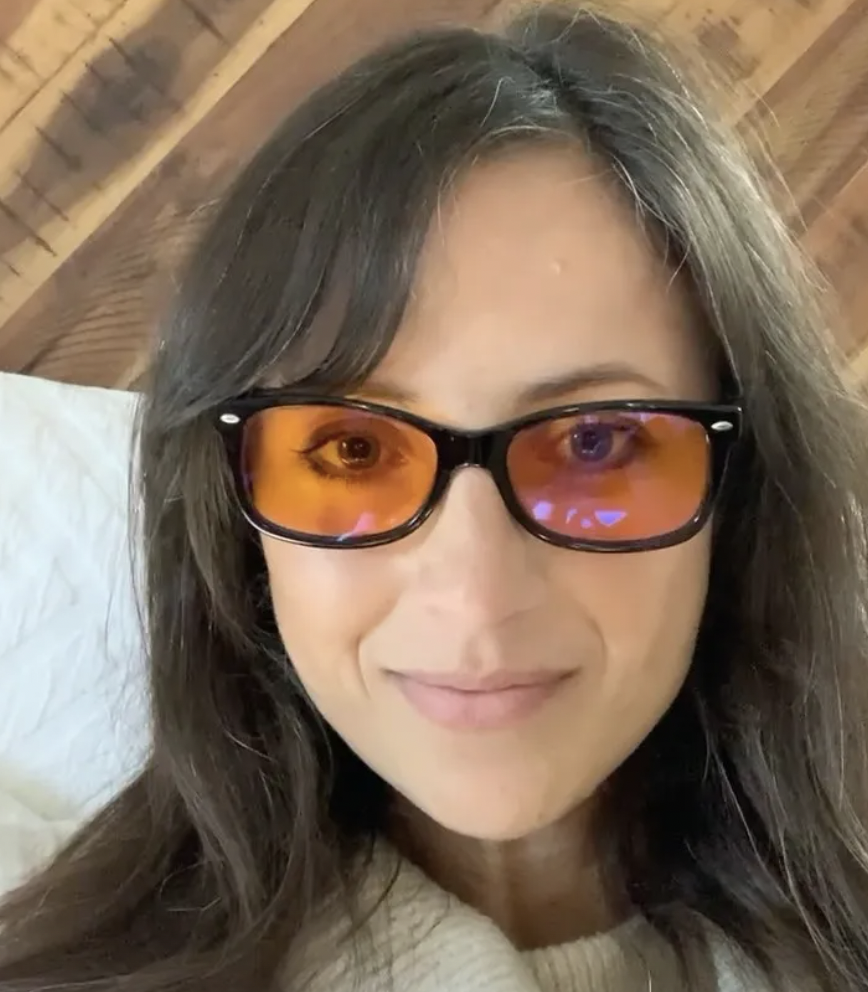
But it’s not just the light that’s problematic with nighttime electronic gadget use. They’re stimulating and even stress-inducing to use. Recent research even suggests that social media sites are anxiety- producing, and can lead to depression.
It’s best to just banish them from the bedroom. People who are disturbed often at night by a cell phone or other device going off have been shown to have sleep disturbances, increased perceived stress, and signs of depression.
Let’s put it this way: would you drink a cup of espresso right before bed?
If you’re struggling to fall asleep at night, chances are you wouldn’t intentionally ingest something stimulating before trying to get some shut-eye. If you think caffeine is a bad idea at bedtime, electronics aren’t much different.
3. Stop eating several hours before bedtime
Eating right before bedtime activates the digestive system, which can disturb sleep. Try to refrain from eating at least two hours before bed.
A person with elevated cortisol who eats before bedtime will experience a big rise in blood sugar, followed by a crash. While eating before bed helps some people get to sleep, in the long run, the sleep is disturbed by blood sugar imbalances.
Fasting before bed has been shown to decrease the brain fog and attention difficulties associated with sleep deprivation.
4. Create a bedtime ritual
A soothing bedtime routine sets the stage for a good night’s sleep.
There’s no doubt that many of us burn the candle at both ends. We go until we simply can’t go anymore. Eventually, we crash – feeling tired, but wired… wanting to sleep, but unable to wind down enough to actually do it. Can you relate?
What your body needs is a signal that it’s the end of the day, and it’s time to relax. Sending emails in bed at midnight doesn’t send this signal.
A bedtime routine doesn’t have to be complicated. For some people, it’s as simple as settling down with a good book to read for a few minutes.
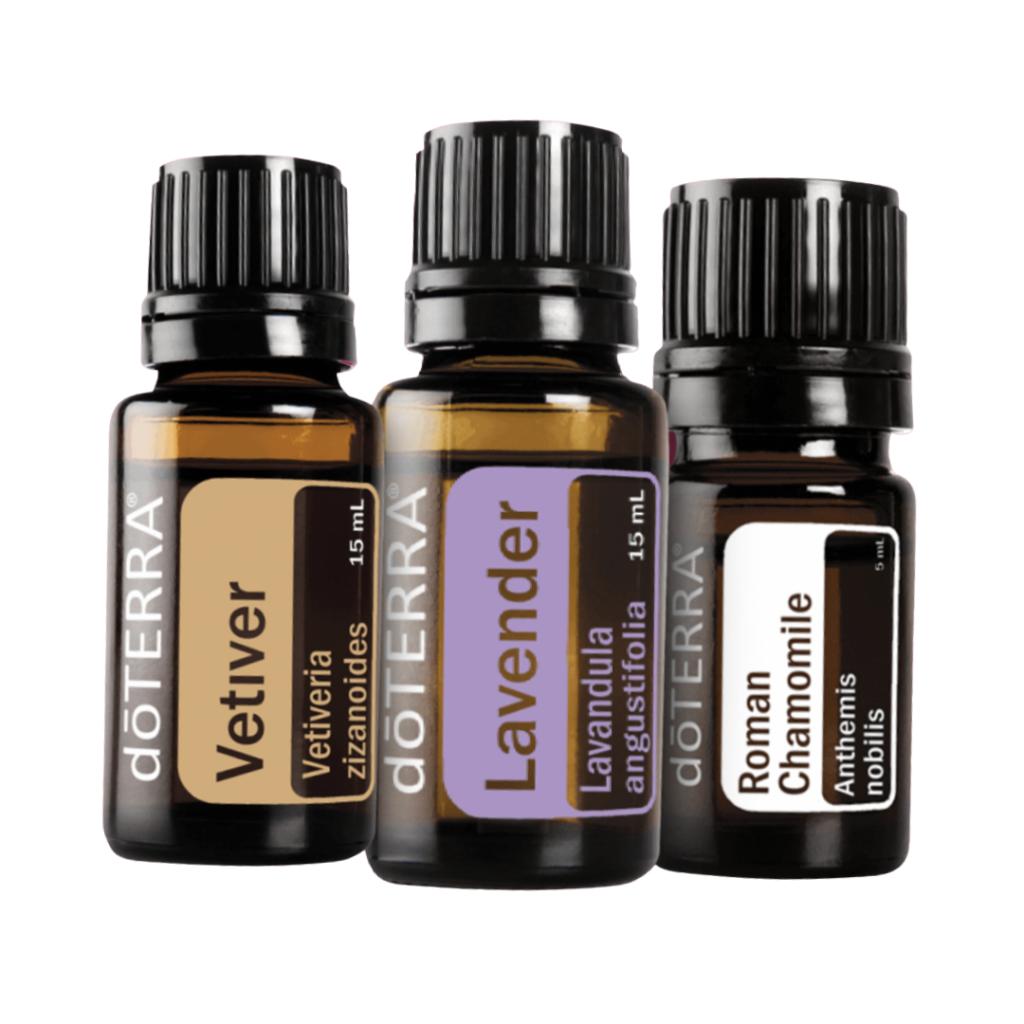
Other possibilities for a bedtime ritual include:
- An epsom salt or magnesium flake bath. I love these magnesium flakes and these epsom salts. Add a few drops of lavender or Serenity essential oil to a cup of salts or flakes before you add them to the water.
- Diffusing 3-4 drops of each of these essential oils – lavender, vetiver and Roman chamomile 1-2 hours before bedtime. If you order these three plus Serenity together, you’ll get wholesale prices and free membership (kinda like Costco, but for essential oils lol).
- Rubbing a few drops of Vetiver on the soles of your feet – this is a game changer, especially if you tend to wake up in the middle of the night! FYI: DoTerra is my go to because their product quality, research and testing are unmatched, and their products have worked so well for myself and my clients over the years.
- Meditation – I loooove laying with my eyes closed for 5-10 minutes while I play binaural beats (you can find playlists on spotify).
- Journalling
- Gentle stretching, or
- A cup of herbal tea (add a drop of Roman chamomile to your tea for even more relaxation before bed)
I encourage you to make your bedroom a sanctuary of rest. Comfortable pillows, luxurious sheets, diffused essential oils or nice smelling (non-toxic) candles, and soft lighting will all contribute to a more relaxed bedtime. Plus, this creates an aura of pampering and self-care, which is always nice!
Also, make sure the bedroom is completely dark when sleeping. Light-blocking curtains help with this. So does removing electronics from the bedroom, which often have indicator lights that can disturb sleep.
If you can’t get your bedroom completely dark, use a sleep mask.
I recently got this one and it’s my new favorite.
I also recommend trying castor oil. This can be used at any time during the day, and for various purposes, but I find it particularly nice as part of a bedtime routine.
Castor oil packs have been shown to increase blood flow / circulation, decrease inflammation and support the nervous system. They are also great for period pain! Apply the pack to your lower belly with a heating pad for thirty to forty-five minutes one to three times a week. You can also sleep with it on for best results.
Here’s the amazon link.
5. Exercise and engage in physical activity earlier in the day
Physical activity is good for sleep, but not right before bed.
An active lifestyle promotes rest. In fact, exercising for 150 minutes per week can significantly improve sleep. A sedentary lifestyle, on the other hand, contributes to sleep disturbances.
I encourage you to exercise regularly, but avoid late night exercise. Unless it’s low-intensity yoga, just skip any pre-bedtime exercise routines.
The best time to exercise is in the morning, when energy should be highest.
Exercising late in the day increases cortisol levels, which can affect sleep. It also can cause blood sugar to dip too low to get good rest. It’s hard for many people to hit the gym in the morning before their busy day begins, but at least trying to fit in exercise before – rather than after dinnertime can help improve sleep. And this will only make mornings easier and create more energy and space for early day activity!
6. Avoid alcohol and caffeine
Sleep quality can be compromised by alcohol and caffeine consumption. Many people turn to caffeine to help fight off the fogginess of sleep deprivation. But that’s probably doing more harm than good because caffeine artificially stimulates the adrenals. Cutting a cup of coffee with half decaf is a great way to start cutting back without feeling the loss of going cold turkey.
Caffeine also decreases the amount of melatonin released from the pineal gland, which contributes to poor sleep.
If you have a cup of coffee in the morning, and you aren’t sleeping well, you may want to consider switching to herbal tea for a week to see if it improves sleep quality.
Alcohol also disturbs sleep. This seems counterintuitive to many – who’ve experienced drowsiness after a glass of wine or after having some cocktails. While it can help people to fall asleep faster, it interferes with rapid eye movement – or REM sleep – the time when people dream. Dream time is extremely important to getting adequate rest, healing the adrenals, and improving daytime wakefulness.
It also increases the incidence of sleep apnea episodes, where a person stops breathing multiple times during the night. This can be life-threatening over time, as sleep apnea has been found to be a risk factor for heart disease and sudden death.
Side note: Sleep apnea can cause mouth breathing while you sleep. When a sleep apnea episode happens, you stop breathing. This makes your brain panic, which leads to a loud snore as your body suddenly gasps for air. These events can create a habit of mouth breathing so that your body gets enough oxygen.
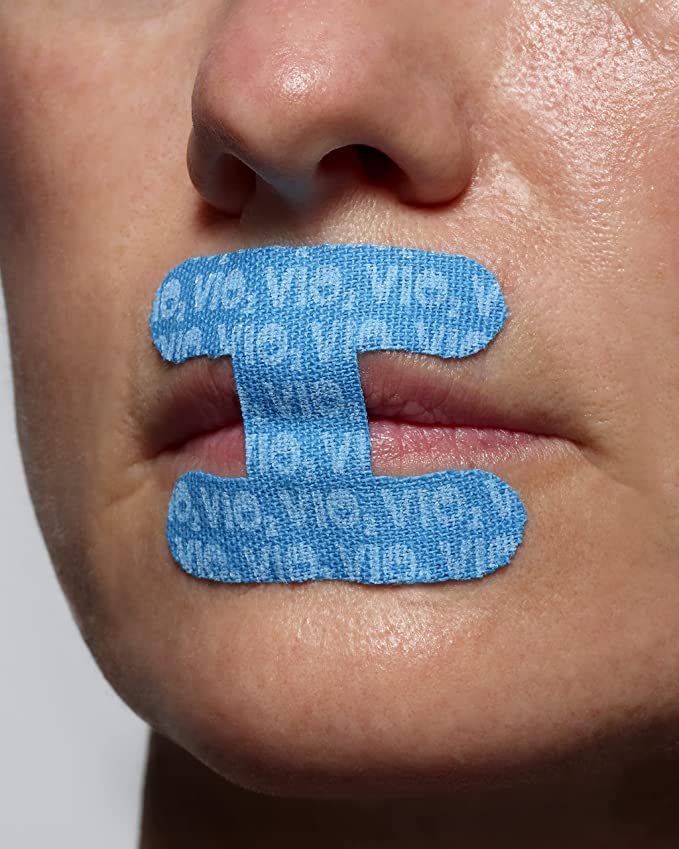
You should be breathing through your nose while you sleep. Breathing through your nose controls your temperature, filters toxins, humidifies and more. That’s why many people, including myself, use mouth tape while sleeping.
This is the brand I use. Give it a try!
Anyway, If you suspect adrenal disturbances, you should steer clear of caffeine and alcohol. To heal, you need rest.
I recognize that many of us have come to rely on these crutches to get through the day and can’t imagine a life without them. I 100% understand and I encourage you to slowly, at your own pace, work toward crowding them out and allowing yourself the opportunity for the beautiful sleep you deserve!
7. Track your sleep
This step is for extra credit, but if you’re nerdy and into health data like me, I highly recommend it!
When you track your sleep, you’re able to monitor your sleep patterns and you can see how much quality sleep you’re getting. This kind of information empowers you to take control of your sleep and optimize your sleep experience.
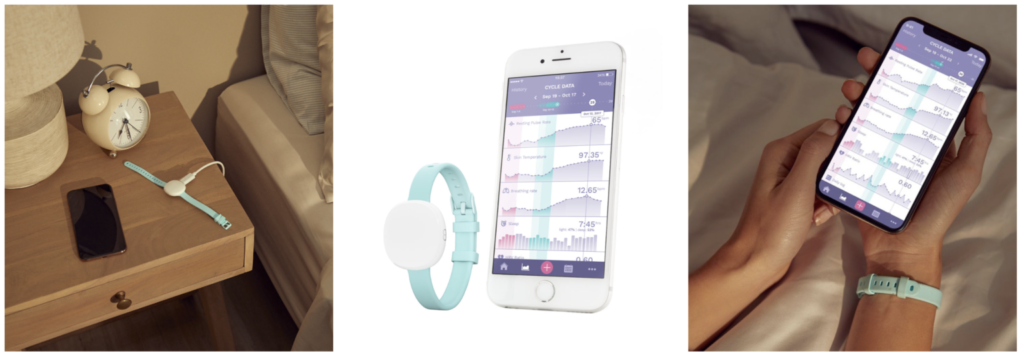
Check out Ava Fertility Tracker – use code NJARDIM for $20 off
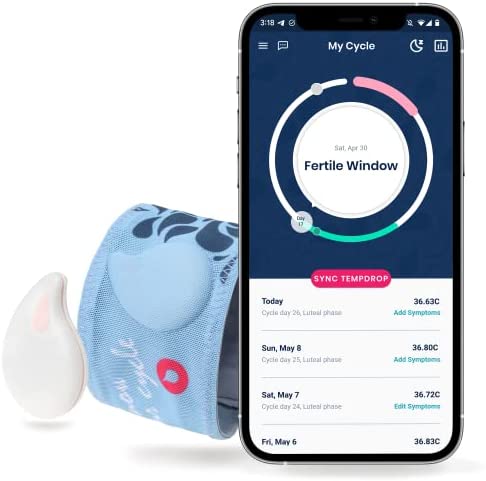
And check out Tempdrop (their Premium option features additional sleep tracking options) – use code AFPERIOD for 10% off
Sweet dreams,
Nicole
3. http://www.fasebj.org/content/10/5/643.short
4. http://ajp.psychiatryonline.org/doi/abs/10.1176/ajp.157.1.81
5. http://www.medicalnewstoday.com/articles/301721.php
6. https://www.ncbi.nlm.nih.gov/pubmed/27308960
7. https://www.ncbi.nlm.nih.gov/pubmed/25092557
8. https://www.ncbi.nlm.nih.gov/pubmed/26730983
10. https://bmcpublichealth.biomedcentral.com/articles/10.1186/1471-2458-11-66
11. http://bodyecology.com/articles/eat-before-bed
12. https://www.sciencedaily.com/releases/2015/06/150604141905.htm
13. https://www.ncbi.nlm.nih.gov/pubmed/27995604
14. http://www.sciencedirect.com/science/article/pii/S1755296611000317
15. https://www.ncbi.nlm.nih.gov/pmc/articles/PMC4404626/
16. https://www.ncbi.nlm.nih.gov/pubmed/23347102
17. http://www.sciencedirect.com/science/article/pii/0002934381901248
